Motivation Letter For College Or University Admission Application
[Your Name]
[Your Address]
[City, State, Zip Code]
[Email Address]
[Phone Number]
[Date]
[Admission Committee/University Name]
[College/University Address]
[City, State, Zip Code]
Dear Members of the Admission Committee,
I am writing this letter to express my sincere interest in pursuing a [Bachelor's/Master's] degree in [Name of Program/Field of Study] at [University Name]. As a highly motivated and ambitious individual, I believe that [University Name] offers the ideal academic environment to nurture my intellectual growth and personal development.
From a young age, I have been passionate about [mention your interest in the field or any specific experiences that influenced your decision to pursue this field]. Throughout my academic journey, I have consistently demonstrated a strong aptitude for [mention relevant subjects or skills], which has further intensified my desire to gain comprehensive knowledge in this domain.
After extensive research on potential educational institutions, I am particularly impressed with [University Name]'s outstanding reputation for academic excellence and commitment to fostering a vibrant and inclusive campus community. The diverse range of resources, state-of-the-art facilities, and renowned faculty members at [University Name] align perfectly with my aspiration to be part of a rigorous and stimulating learning environment.
In addition to academic pursuits, I am eager to actively participate in extracurricular activities and engage in meaningful collaborations with my peers. I firmly believe that a well-rounded education extends beyond the classroom, and I am committed to contributing positively to the [University Name] community.
Furthermore, [mention any research, projects, or achievements relevant to your chosen field of study]. These experiences have not only honed my skills but have also instilled in me a deep sense of responsibility towards addressing real-world challenges.
I strongly believe that studying at [University Name] will not only empower me with the necessary knowledge and skills but also open doors to valuable opportunities and networks in my field. It is my sincere hope to leverage these resources to make a significant and lasting impact on society.
I am confident that [University Name] is the perfect fit for my academic and personal growth. I assure you that if given the opportunity, I will approach my studies with dedication, enthusiasm, and a commitment to excellence. I am eager to contribute my ideas and perspectives to enrich the academic community at [University Name].
Thank you for considering my application. I look forward to the opportunity to contribute to the diverse fabric of [University Name] and make the most of the education it provides.
Yours sincerely,
[Your Name]
General University Admission Motivation Letter
Dear Admissions Committee,
I am writing to express my strong interest in pursuing [Program Name] at [University Name] for the [Academic Year] intake. As a dedicated student with a passion for [Field of Study], I believe your institution's exceptional curriculum and research opportunities align perfectly with my academic aspirations and career goals.
Throughout my academic journey, I have consistently demonstrated excellence in [relevant subjects], maintaining a [GPA/Grade] average. My particular interest in [specific area] was sparked during [experience/event], which revealed to me the profound impact this field has on [relevant application/society]. This experience solidified my determination to pursue advanced studies in this discipline.
What draws me specifically to [University Name] is [specific programs/professors/facilities/research centers]. I am particularly impressed by [specific detail about the university], which I believe will provide me with the theoretical foundation and practical skills necessary to excel in my future career as a [intended profession].
Beyond academics, I have actively engaged in [extracurricular activities/volunteer work/internships] that have shaped my perspective and developed essential skills such as [leadership/teamwork/problem-solving]. These experiences have taught me the value of [relevant lesson] and prepared me to contribute meaningfully to your university community.
I am confident that my academic background, passion for learning, and commitment to personal growth make me an ideal candidate for your program. I look forward to the opportunity to contribute to and learn from the diverse community at [University Name].
Thank you for considering my application. I am eager to discuss how I can contribute to and benefit from your esteemed institution.
Sincerely,
[Your Name]
STEM Program Motivation Letter (Engineering/Computer Science/Mathematics)
Dear Admissions Committee,
I am applying for admission to the [Specific Program] at [University Name], driven by my fascination with solving complex technical challenges and my commitment to innovation in [specific STEM field].
My journey into [STEM field] began when I [specific early experience], which opened my eyes to the elegance of [mathematical principles/engineering solutions/computational thinking]. Since then, I have pursued every opportunity to deepen my understanding, completing advanced coursework in [relevant subjects], participating in [competitions/hackathons/science fairs], and achieving [specific accomplishments].
A defining moment in my academic career was [specific project/research/internship experience]. During this experience, I [describe technical challenge and your approach], which resulted in [outcome]. This project not only enhanced my technical skills in [programming languages/engineering tools/mathematical modeling] but also taught me the importance of systematic problem-solving and iterative design.
[University Name]'s reputation for cutting-edge research in [specific research area] and its state-of-the-art facilities, particularly [specific lab/center], make it my top choice. I am especially interested in the work of Professor [Name] on [research topic], and I hope to contribute to similar innovations during my studies.
I have also prepared myself through practical experience, including [internships/personal projects/online courses]. These experiences have given me hands-on familiarity with [specific technologies/methodologies] and reinforced my readiness for rigorous university-level study.
My goal is to become a [specific career goal] who contributes to [specific impact area]. I am confident that [University Name] will provide the rigorous training, collaborative environment, and research opportunities necessary to achieve this ambition.
Thank you for considering my application. I am excited about the possibility of joining your academic community.
Best regards,
[Your Name]
Arts and Humanities Motivation Letter (Literature/History/Philosophy)
Dear Members of the Admissions Committee,
I write to you with genuine enthusiasm about the prospect of studying [Program Name] at [University Name]. My passion for [humanities field] stems from a deep-seated belief in the power of [critical thinking/cultural understanding/historical perspective] to illuminate the human condition and inform our present choices.
Literature has been my constant companion since childhood, but it was reading [specific work/author] that transformed my casual interest into scholarly passion. The way [author/work] explores [theme/concept] revealed to me that studying [humanities field] is not an escape from the real world but rather the most profound engagement with it.
My academic preparation includes extensive coursework in [relevant subjects], where I have particularly excelled in [specific area]. I have also undertaken independent research on [topic], resulting in [paper/presentation/project]. This research challenged me to [specific intellectual challenge] and confirmed my desire to pursue advanced study in this field.
What distinguishes [University Name] in my mind is its interdisciplinary approach to [field], particularly through [specific program/department feature]. The opportunity to study under scholars like Professor [Name], whose work on [topic] has profoundly influenced my thinking, is invaluable. Additionally, access to your [library/archives/collections] would be instrumental for my intended research on [topic].
Beyond the classroom, I have engaged with [field] through [relevant activities: writing, tutoring, cultural organizations, publications]. These experiences have developed my [analytical writing/critical thinking/research skills] while connecting me with communities that share my intellectual curiosity.
My ultimate aspiration is to [career goal: contribute to scholarship/work in education/pursue cultural preservation], and I believe that [University Name]'s rigorous program will equip me with the sophisticated analytical tools and broad cultural knowledge necessary for this path.
Thank you for considering my application. I would be honored to join your intellectual community.
Warm regards,
[Your Name]
Business School Motivation Letter (MBA/Business Administration)
Dear Admissions Committee,
I am writing to apply for the [Program Name] at [University Name], confident that this program represents the ideal next step in my professional journey. With [X years] of experience in [industry/field] and a proven track record of [specific achievements], I am ready to expand my strategic thinking and leadership capabilities through your distinguished program.
My career began at [Company], where I [describe role and responsibilities]. Over the years, I have progressed to [current position], where I have successfully [specific accomplishments with quantifiable results]. These experiences have taught me valuable lessons about [business concepts], but they have also revealed gaps in my knowledge, particularly in [areas you want to develop].
A pivotal moment came when I [describe significant professional challenge or decision]. This experience highlighted the need for [specific business skills/knowledge] and motivated me to pursue formal business education. I realized that intuition and experience alone are insufficient for navigating today's complex business landscape—I need the analytical frameworks and strategic tools that an MBA provides.
[University Name]'s program stands out for its [specific program features: case method/global perspective/entrepreneurship focus/industry connections]. I am particularly drawn to [specific courses/concentrations/centers], which directly address my goal of [career objective]. The opportunity to learn from faculty members like Professor [Name], whose research on [topic] aligns with my interests, is especially compelling.
I also value the diverse cohort that [University Name] attracts. Having worked in [multicultural/international] environments, I understand the importance of diverse perspectives in driving innovation and making sound business decisions. I look forward to contributing my experience in [your expertise area] while learning from classmates with different backgrounds.
My short-term goal after graduation is to [specific goal], while my long-term aspiration is to [career vision]. I am confident that [University Name] will provide the education, network, and platform necessary to achieve these objectives.
Thank you for considering my application. I look forward to contributing to and learning from your dynamic community.
Sincerely,
[Your Name]
Medical School Motivation Letter
Dear Admissions Committee,
I am honored to apply for admission to [Medical School Name]'s medical program. My decision to pursue medicine is rooted in a combination of scientific curiosity, compassion for others, and a deep-seated commitment to serving my community through healthcare.
My interest in medicine crystallized during [formative experience: volunteering at hospital/family medical event/shadowing physician]. Witnessing [specific experience], I was struck by the profound privilege and responsibility that physicians carry. This experience revealed that medicine is not merely about treating diseases but about treating people—understanding their fears, respecting their dignity, and supporting them through vulnerable moments.
Academically, I have prepared rigorously for medical school, excelling in [relevant courses: biology, chemistry, anatomy] and achieving [GPA/test scores]. My research experience in [laboratory/field] has taught me the importance of evidence-based medicine and critical analysis. Working on [specific research project], I gained insight into [medical concept/condition] and contributed to [publication/presentation/finding].
Beyond academics, I have accumulated over [number] hours of clinical experience through [volunteering/shadowing/EMT work/medical missions]. These experiences have exposed me to diverse patient populations and healthcare settings, from [specific settings]. Each experience reinforced my commitment to medicine while revealing the challenges physicians face—long hours, difficult decisions, and emotional strain—which I am prepared to embrace.
[Medical School Name] attracts me because of its commitment to [specific mission/approach: primary care/research/underserved communities/global health]. Your curriculum's emphasis on [specific feature: early clinical exposure/problem-based learning/community health] aligns perfectly with my learning style and values. I am particularly interested in [specific department/program/initiative] and hope to contribute to [specific area].
My goal is to become a physician who combines clinical excellence with [research/advocacy/education/community service]. I am committed to serving [specific population/community] and addressing healthcare disparities that affect [specific issue].
Thank you for considering my application. I am eager to begin this challenging and rewarding journey at your institution.
Respectfully,
[Your Name]
Transfer Student Motivation Letter
Dear Transfer Admissions Committee,
I am writing to apply for transfer admission to [University Name] for the [semester/year]. After careful reflection on my academic goals and current educational experience at [Current University], I am convinced that transferring to your institution is essential for my academic and professional development.
I began my undergraduate studies at [Current University] with enthusiasm and optimism. While I have valued certain aspects of my experience, including [positive elements: specific courses/professors/opportunities], I have come to realize that the program does not fully align with my academic aspirations and learning style. Specifically, [explain specific limitations: lack of research opportunities/limited course offerings in your field/program structure].
My time at [Current University] has not been without value. I have maintained a [GPA] while completing coursework in [subjects], and I have been actively involved in [activities]. These experiences have clarified my academic interests and confirmed my passion for [field of study]. However, to reach my full potential, I need the resources and opportunities that [University Name] provides.
What draws me to [University Name] is [specific programs/research centers/faculty/curriculum features]. I am particularly excited about [specific opportunity: research laboratory/study abroad program/interdisciplinary major/specific courses] which is not available at my current institution. The opportunity to work with Professor [Name] on [research area] and take courses like [specific course names] would be transformative for my education.
I have also considered how I can contribute to your community. My experience at [Current University] has prepared me to hit the ground running, and I am eager to join [specific clubs/organizations/research groups] at [University Name]. My perspective as a transfer student, combined with my experience in [specific area], would add value to classroom discussions and group projects.
Transferring is not a decision I have made lightly. I have thoroughly researched [University Name]'s program and am confident that this move represents the best path forward for achieving my goal of [career/academic goal]. I am prepared for the challenges of transition and am committed to making the most of every opportunity.
Thank you for considering my transfer application. I look forward to the possibility of continuing my education at [University Name].
Sincerely,
[Your Name]
Graduate School Research-Focused Motivation Letter (Master's/PhD)
Dear Graduate Admissions Committee,
I am writing to apply for admission to the [Master's/Ph.D.] program in [Department] at [University Name]. My application is motivated by a clear research agenda in [specific research area] and a strong belief that your program offers the ideal environment for pursuing this work.
My research interests emerged from [describe origin of research interest]. This initial curiosity evolved into serious scholarly inquiry during my undergraduate thesis on [topic], where I investigated [research question]. My findings, which [briefly describe results], raised further questions about [related area] that I am eager to explore at the graduate level.
I am particularly drawn to [University Name] because of its strength in [specific research area]. Professor [Name]'s groundbreaking work on [topic] directly relates to my research interests, and I would be honored to work under their guidance. Additionally, Professor [Name2]'s research on [related topic] offers exciting possibilities for interdisciplinary collaboration. The [specific lab/research center] provides exactly the resources and intellectual community necessary for advancing my research agenda.
My proposed research focuses on [specific research question/problem]. Preliminary investigation suggests that [hypothesis/approach], which I plan to explore using [methodology/theoretical framework]. This research addresses a significant gap in current literature, namely [gap in knowledge], and has potential implications for [theoretical/practical applications].
I have prepared for graduate-level research through [research experiences: thesis/independent study/research assistant position/publications]. These experiences have equipped me with skills in [research methods/analysis techniques/theoretical frameworks] and taught me the realities of scholarly work—the patience required for careful analysis, the intellectual humility to revise hypotheses, and the persistence needed when faced with obstacles.
Beyond research, I am committed to contributing to your department through [teaching/mentoring/service/collaboration]. I have experience in [relevant teaching/leadership experience] and look forward to engaging with the broader academic community through [conferences/seminars/workshops].
My ultimate goal is to pursue a career in [academia/research institution/industry research], where I can continue investigating [broad research area] and training the next generation of scholars. I am confident that [University Name]'s rigorous program will provide the foundation for this career.
Thank you for considering my application. I would welcome the opportunity to discuss my research interests further.
Sincerely,
[Your Name]
Creative Arts Program Motivation Letter (Fine Arts/Music/Theater/Film)
Dear Admissions Committee,
I am thrilled to apply for the [Program Name] at [University Name]. Art has been my language, my refuge, and my passion for as long as I can remember, and I am ready to dedicate myself fully to developing my craft under the guidance of your distinguished faculty.
My artistic journey began [describe origin story], but it was [specific experience/moment] that revealed to me that this was not merely a hobby but my calling. Since then, I have devoted myself to [specific art form], constantly pushing my boundaries and exploring new techniques and concepts.
My artistic practice centers on [themes/concepts/style]. I am fascinated by [specific artistic interest] and how it [relates to broader meaning/human experience]. My recent work, including [describe significant pieces/performances/projects], explores [artistic concept] through [medium/technique]. This work has been [recognized/exhibited/performed] at [venues/competitions/festivals], which has given me valuable feedback and exposure to diverse artistic perspectives.
Technically, I have developed proficiency in [specific skills/techniques/tools], and I am constantly seeking to expand my capabilities. I have studied [relevant techniques/theories] and am comfortable working with [specific mediums/technologies/processes]. However, I recognize that technical skill alone does not make art—it is the combination of craft, concept, and courage that creates meaningful work.
[University Name]'s program attracts me because of its [specific program features: experimental approach/interdisciplinary opportunities/facilities/faculty]. The chance to study with artists like Professor [Name], whose work on [artistic area] has profoundly influenced my thinking, is invaluable. Additionally, your program's emphasis on [specific pedagogical approach] aligns with my belief that artistic growth requires both rigorous training and creative freedom.
I am also drawn to your collaborative environment. I believe that artists grow through dialogue and exchange with other creative minds. I look forward to contributing my perspective while being challenged and inspired by my peers working in [different mediums/approaches].
Beyond my individual practice, I have engaged with the artistic community through [relevant activities: exhibitions/performances/collaborations/arts organizations]. These experiences have taught me that art exists in relationship—with audiences, with other artists, with cultural contexts.
My aspiration is to develop a sustainable artistic practice that [specific artistic goal: pushes boundaries/contributes to social dialogue/explores new media/preserves tradition]. I am committed to the discipline, vulnerability, and perseverance that an artistic life requires.
Thank you for considering my application. I would be honored to continue my artistic development at [University Name].
With gratitude,
[Your Name]
What is a Motivation Letter for College or University Admission and Why Do You Need It
A motivation letter for college or university admission is a personal statement that explains your reasons for applying to a specific academic program and institution. It serves as your opportunity to present yourself beyond grades and test scores, showcasing your personality, aspirations, and fit with the program.
- Demonstrates your genuine interest in the specific program and institution
- Highlights experiences, achievements, and qualities not evident in transcripts
- Explains your academic and career goals and how the program aligns with them
- Differentiates you from other applicants with similar academic credentials
- Shows your writing ability, critical thinking, and self-awareness
- Addresses any weaknesses or gaps in your application with proper context
- Helps admissions committees assess whether you'll thrive in their environment
- Provides evidence of your research about the program and commitment to attending
When Do You Need to Submit a Motivation Letter for Admission
- Regular undergraduate admissions: Most universities require motivation letters as part of standard application packages
- Graduate program applications: Essential for master's and doctoral programs where research interests must be articulated
- Competitive or selective programs: Especially important when applying to programs with limited spots
- Transfer applications: When moving from one institution to another to explain your reasons for transferring
- Scholarship applications: Often required alongside admission applications to demonstrate merit
- International student applications: Critical for explaining why you're choosing to study abroad
- Programs requiring specific prerequisites: When you need to justify your preparedness despite unconventional backgrounds
- Early decision or early action applications: To demonstrate strong commitment to the institution
- Special admissions pathways: Including mature student admissions or alternative entry routes
- Reapplication scenarios: When applying again after previous rejection to show growth and renewed commitment
Elements and Structure Every Motivation Letter Should Include
- Opening paragraph: Clear statement of the program and university you're applying to, with immediate indication of your enthusiasm
- Academic background: Relevant coursework, achievements, GPA, and how your studies prepared you for this program
- Specific experiences: Concrete examples from internships, research, projects, or work that demonstrate your interest and capabilities
- Connection to the program: Specific reasons why this particular program at this specific university appeals to you
- Faculty mentions: Reference to specific professors, research centers, or unique program features that attract you
- Career goals: Clear articulation of your short-term and long-term professional aspirations
- Personal qualities: Characteristics that make you a good fit, supported by examples rather than mere claims
- Contribution statement: What you will bring to the university community beyond academics
- Closing paragraph: Gracious conclusion that reaffirms your interest and enthusiasm
- Professional tone throughout: Appropriate balance between formal and personal writing
How to Write and Send Your University Motivation Letter
- Research thoroughly: Spend time on the university website understanding program details, faculty research, and institutional values
- Brainstorm experiences: List all relevant academic, professional, volunteer, and personal experiences that connect to your application
- Create an outline: Organize your ideas logically before writing to ensure coherent flow
- Write multiple drafts: First draft focuses on getting ideas down; subsequent drafts refine language and structure
- Be specific and concrete: Use real examples with details rather than generic statements about passion or dedication
- Show don't tell: Demonstrate qualities through stories rather than listing adjectives
- Customize for each university: Never send the same generic letter to multiple institutions
- Address any concerns proactively: If you have gaps, low grades, or unusual circumstances, explain them honestly
- Get feedback: Have professors, mentors, or writing centers review your letter before submission
- Proofread meticulously: Errors in a motivation letter are particularly damaging
- Follow application instructions: Submit through the specified portal, in the required format, by the deadline
- Save copies: Keep records of what you submitted to each institution
Who Should Write and Send the Motivation Letter
- The applicant themselves: Motivation letters must be written by the student applying, not parents, agents, or tutors
- Undergraduate applicants: High school students applying for bachelor's degree programs
- Graduate school candidates: Students with bachelor's degrees applying for master's or doctoral programs
- Transfer students: Current university students seeking to move to different institutions
- International students: Applicants from other countries seeking to study abroad
- Mature students: Adult learners returning to education after time in workforce
- Career changers: Professionals seeking to transition fields through new academic credentials
- Gap year students: Applicants who took time off between educational stages
- Reapplicants: Students applying again after previous unsuccessful attempts
The letter must reflect your authentic voice and genuine experiences—admissions committees can detect inauthentic or ghost-written letters.
To Whom Should You Address Your Motivation Letter
- Admissions Committee: Default addressee when no specific person is named, using "Dear Admissions Committee"
- Program Director: For graduate programs, sometimes addressed to the specific program director
- Department Chair: In some cases, especially for smaller departments or specialized programs
- Dean of Admissions: For some institutions, particularly smaller colleges
- Selection Committee: For competitive scholarships or special programs
- Generic greeting when uncertain: "Dear Members of the Admissions Committee" works universally
Research the application guidelines carefully—some institutions specify how to address the letter. When no specific person is named, avoid outdated "To Whom It May Concern" and never use "Dear Sir or Madam" as it assumes gender. The greeting should be formal and professional regardless of addressee.
Formatting Guidelines for Your Motivation Letter
- Length: Typically 500-1000 words (one to two pages single-spaced), unless specified otherwise
- Format: Business letter format with your contact information, date, and recipient's address if submitting by mail
- Font and spacing: Professional font (Times New Roman, Arial, Calibri) in 11-12pt, single or 1.5 line spacing
- Margins: Standard one-inch margins on all sides
- Paragraphs: Clear paragraph breaks, typically 4-6 substantial paragraphs
- Tone: Professional yet personal, enthusiastic but not overly emotional, confident without arrogance
- Language level: Sophisticated but clear, avoiding jargon unless discipline-specific and appropriate
- File format: Usually PDF to preserve formatting, unless the application system specifies otherwise
- Filename convention: Use clear naming like "MotivationLetter_YourName_ProgramName.pdf"
- Submission method: Follow instructions precisely—upload to application portal, email, or mail as specified
- Signature: If submitting hard copy, include handwritten signature; digital submissions typically don't require this
Requirements and Prerequisites Before Writing Your Letter
- Complete research about the program: Understand curriculum, faculty, research opportunities, and unique features
- Review admission requirements: Know GPA minimums, test scores, prerequisites, and what the committee values
- Gather your materials: Have transcripts, CV, test scores, and experience records readily available
- Identify your narrative: Determine the central story or theme that connects your experiences to your goals
- List specific faculty or resources: Note professors whose research interests you, labs, centers, or opportunities you want to access
- Clarify your goals: Have clear short-term and long-term objectives articulated
- Collect examples and evidence: Specific stories, projects, achievements, and experiences to reference
- Understand word limits: Know exact length requirements before beginning to write
- Check deadline: Ensure you have adequate time for writing, revision, and feedback
- Review successful examples: Read sample letters from your field to understand conventions and expectations
- Prepare questions to address: Be ready to explain gaps, weaknesses, or unusual aspects of your application
Tips and Best Practices for Writing Effective Motivation Letters
- Start early: Begin weeks before the deadline to allow time for multiple revisions
- Lead with your strongest material: Capture attention immediately with your most compelling reason or experience
- Use active voice: Write with strong, direct sentences rather than passive constructions
- Quantify achievements when possible: Include numbers, percentages, or rankings to give concrete evidence
- Tell a story: Weave a narrative arc rather than listing disconnected facts
- Connect past experiences to future goals: Show logical progression and explain how the program bridges past and future
- Demonstrate fit: Explicitly connect your interests and goals to specific program offerings
- Show enthusiasm authentically: Let genuine excitement come through without hyperbole or excessive flattery
- Be honest about challenges: Addressing weaknesses with maturity is more effective than ignoring them
- Vary sentence structure: Mix short and long sentences for better readability and rhythm
- Use specific program terminology: Show familiarity by using correct names for programs, centers, and initiatives
- End strongly: Conclude with confidence and clear next steps rather than weak or apologetic language
- Read aloud: Hearing your letter helps identify awkward phrasing and ensures natural flow
Common Mistakes to Avoid in Your Motivation Letter
- Generic content: Using the same letter for multiple universities without customization
- Wrong university name: Failing to change institution names when adapting letters—extremely damaging error
- Excessive flattery: Spending too much space praising the university instead of focusing on yourself
- Vague statements: Saying you're "passionate" or "hardworking" without evidence or examples
- Listing without context: Simply repeating information from your CV without adding meaning or interpretation
- Neglecting research: Not mentioning specific faculty, programs, or resources at the institution
- Overconfidence or arrogance: Sounding entitled to admission or dismissive of challenges
- Excessive humility: Underselling your achievements or apologizing for your application
- Grammar and spelling errors: Typos signal carelessness and undermine your credibility
- Inappropriate tone: Being too casual, using slang, or attempting humor that falls flat
- Unclear goals: Being vague about what you want to study or achieve
- Ignoring the prompt: Failing to address specific questions or requirements in application instructions
- Excessive length: Writing far beyond word limits shows inability to follow directions
- Clichés and platitudes: Opening with overused quotes or generic statements about education
- Negativity: Criticizing former institutions, professors, or competitors
After Sending Your Letter: Follow-Up Actions
- Confirm receipt: Check that all application materials, including your motivation letter, were successfully submitted
- Monitor application status: Regularly check the application portal for updates or requests for additional materials
- Save a copy: Keep the exact version you submitted for potential interview preparation
- Note submission dates: Record when you applied to track timelines and deadlines
- Prepare for interviews: Review your motivation letter as many interview questions will reference what you wrote
- Do not send unsolicited updates: Unless you have significant new achievements (major award, publication), avoid emailing additional information
- Be patient: Admission decisions take time; excessive follow-up appears desperate and is counterproductive
- Respond promptly to requests: If the committee requests additional information or schedules an interview, respond immediately
- Maintain professionalism: All communication with admissions should maintain the professional tone of your letter
- Prepare for possible rejection: Have backup options and understand that rejection doesn't diminish your worth
- Thank interviewers if applicable: Send brief thank-you emails after interviews, referencing specific conversation points
Generally, motivation letters do not require confirmation of receipt beyond what the application system provides automatically. Unlike business correspondence, following up to ask "Did you receive my application?" is unnecessary and may be viewed as pestering.
How Long Should Your Motivation Letter Be
- Standard length: 500-750 words is typical for undergraduate applications
- Graduate programs: Often require 750-1000 words or up to two pages
- Strict word limits: Some applications specify exact limits (e.g., "maximum 600 words")—never exceed these
- Page limits: When given as pages, assume single-spaced text in standard formatting
- Minimum expectations: Anything under 400 words typically appears insufficiently developed
- Reading time consideration: Admissions officers spend 3-5 minutes per letter on average
- Quality over quantity: A focused 600-word letter is better than a rambling 1000-word one
- Program-specific variations: Creative programs may allow more flexibility; professional programs often prefer concise letters
- Multiple letters in application: If supplemental essays are required, keep the main letter within standard range
Always check specific application requirements first. When no guidance is provided, aim for approximately 700 words or one single-spaced page.
Comparing Motivation Letters to Other Application Documents
Motivation Letter vs. Personal Statement:
- Motivation letters focus on why you want this specific program at this institution
- Personal statements are broader, focusing on who you are and your overall journey
- Motivation letters emphasize fit and future goals; personal statements emphasize character development
Motivation Letter vs. Statement of Purpose:
- Statements of purpose are more research-focused and academic in tone
- Motivation letters can be slightly more personal and emotional
- Both explain your goals, but SoPs emphasize research agenda more heavily
Motivation Letter vs. Cover Letter:
- Cover letters accompany job applications; motivation letters accompany academic applications
- Cover letters emphasize skills and qualifications; motivation letters emphasize passion and potential
- Both require customization, but motivation letters allow more personal reflection
Motivation Letter vs. Letters of Recommendation:
- You write your motivation letter; professors/employers write recommendation letters
- Motivation letter is first-person advocacy; recommendations provide third-party validation
- Both are essential, but they serve complementary purposes
Alternative approaches:
- Some applicants create video statements when allowed, adding personality
- Portfolio-based applications may reduce emphasis on written motivation letters
- Interview-heavy processes may minimize the letter's importance
Advantages and Disadvantages of Submitting Strong Motivation Letters
Advantages:
- Differentiation: Helps you stand out when academic credentials are similar among applicants
- Context: Allows explanation of circumstances behind grades or gaps in education
- Personality showcase: Reveals character, values, and communication skills beyond numbers
- Demonstrated interest: Shows you've researched and are genuinely interested in this specific program
- Weakness mitigation: Provides opportunity to address potential concerns proactively
- Writing skill demonstration: Proves your ability to communicate effectively in academic settings
- Memorable impression: Well-crafted letters stay with admissions committees during decisions
Disadvantages or Risks:
- Time-consuming: Requires significant effort to write well, especially for multiple applications
- Potential for errors: Mistakes can seriously damage your application
- Difficult to perfect: Hard to know when a letter is "good enough" versus requiring more revision
- Subjectivity: Different readers may interpret the same letter differently
- Pressure and anxiety: Creates stress as applicants worry about striking the right tone
- Can hurt weak applications: A poorly written letter may confirm doubts rather than assuage them
- Generic attempts backfire: Rushed or generic letters are worse than no letter in some cases
The advantages significantly outweigh disadvantages when the letter is thoughtfully crafted and properly executed.
Frequently Asked Questions About Motivation Letters
Can I use the same letter for multiple universities? Never submit identical letters. While you can use a template structure, each letter must be specifically customized with institution-specific details, faculty names, and program features.
Should I mention other universities I'm applying to? No. Treat each application as if this institution is your only choice. Mentioning alternatives suggests lack of commitment.
What if I don't know my exact career goals yet? Provide your current thinking and areas of interest while acknowledging openness to evolution. Show direction without claiming absolute certainty.
Can I mention personal hardships or challenges? Yes, if relevant to your academic journey and presented constructively. Focus on resilience and growth rather than seeking sympathy. Keep it brief unless it significantly impacted your application.
Should I mention rankings or prestige? Avoid focusing on rankings. Instead, mention specific programs, faculty, resources, or opportunities that genuinely attract you to the institution.
Is humor appropriate? Generally risky. If humor is natural to your voice and fits the discipline (perhaps creative fields), use it sparingly. Professional programs expect serious tone.
How personal should I be? Share enough personal information to be authentic and memorable, but maintain professional boundaries. Avoid overly intimate details or controversial topics.
What if I have no research experience for graduate school? Emphasize related experiences: coursework, independent projects, professional work, or how you've prepared intellectually. Show enthusiasm for learning research skills.
Should I explain a low GPA? If there's a legitimate reason (illness, family crisis, financial hardship requiring excessive work hours), briefly explain with focus on improvement and lessons learned.
Can I mention financial need? Only if specifically asked or if discussing scholarship applications. Motivation letters focus on academic fit, not financial circumstances.

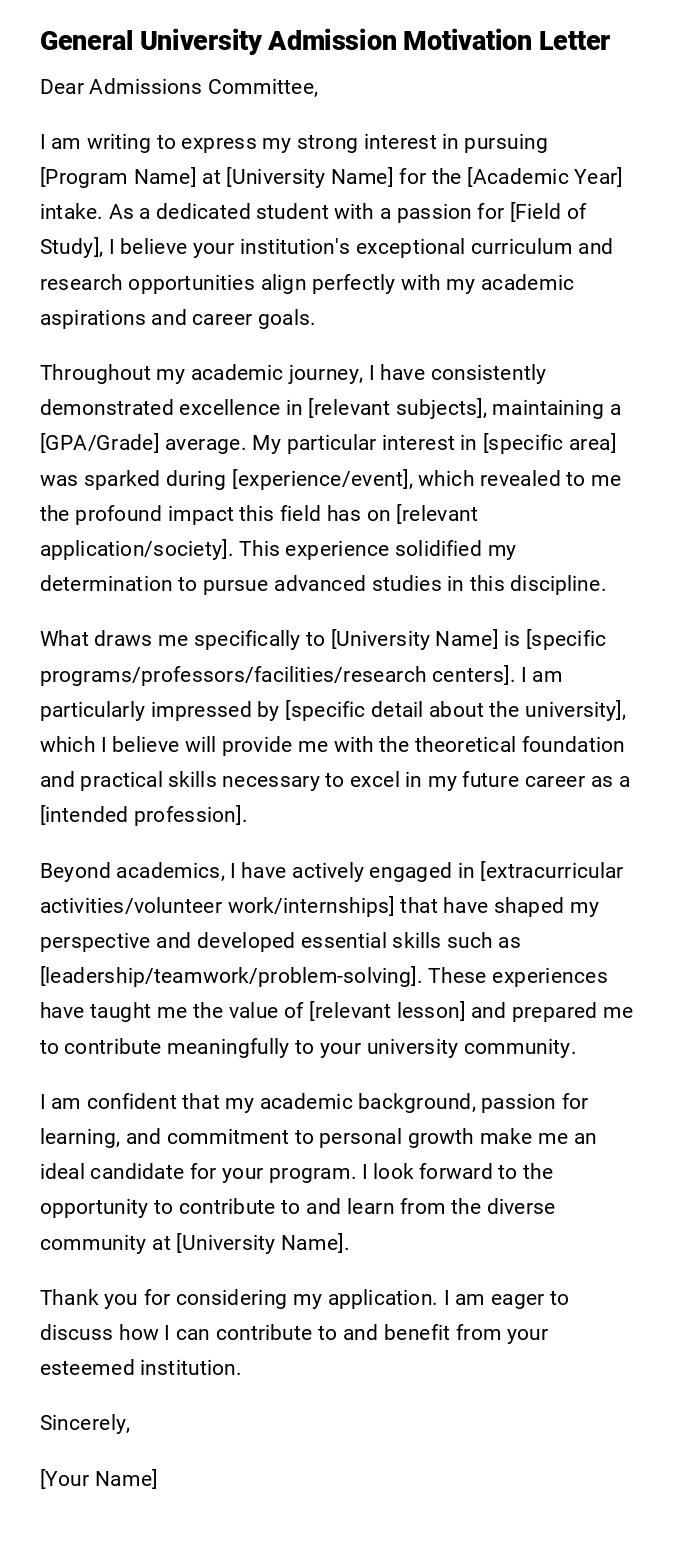
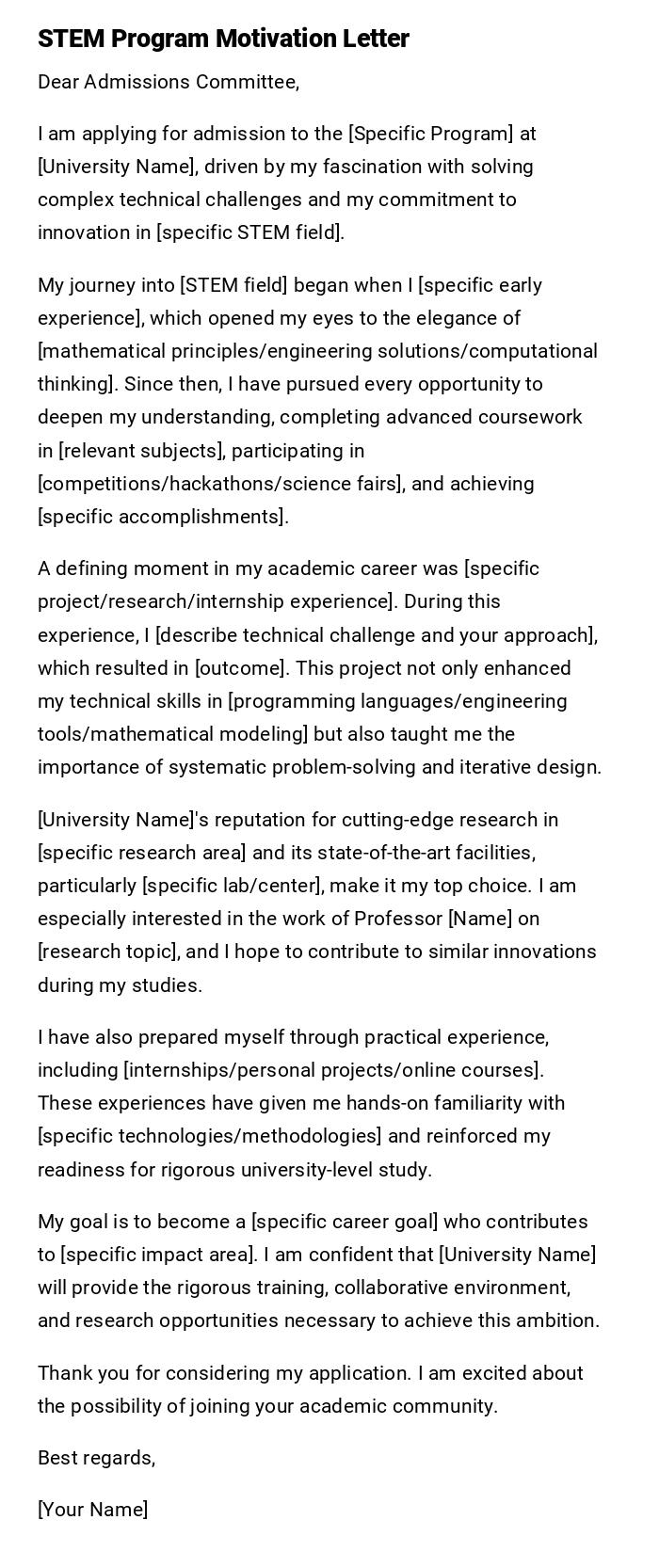
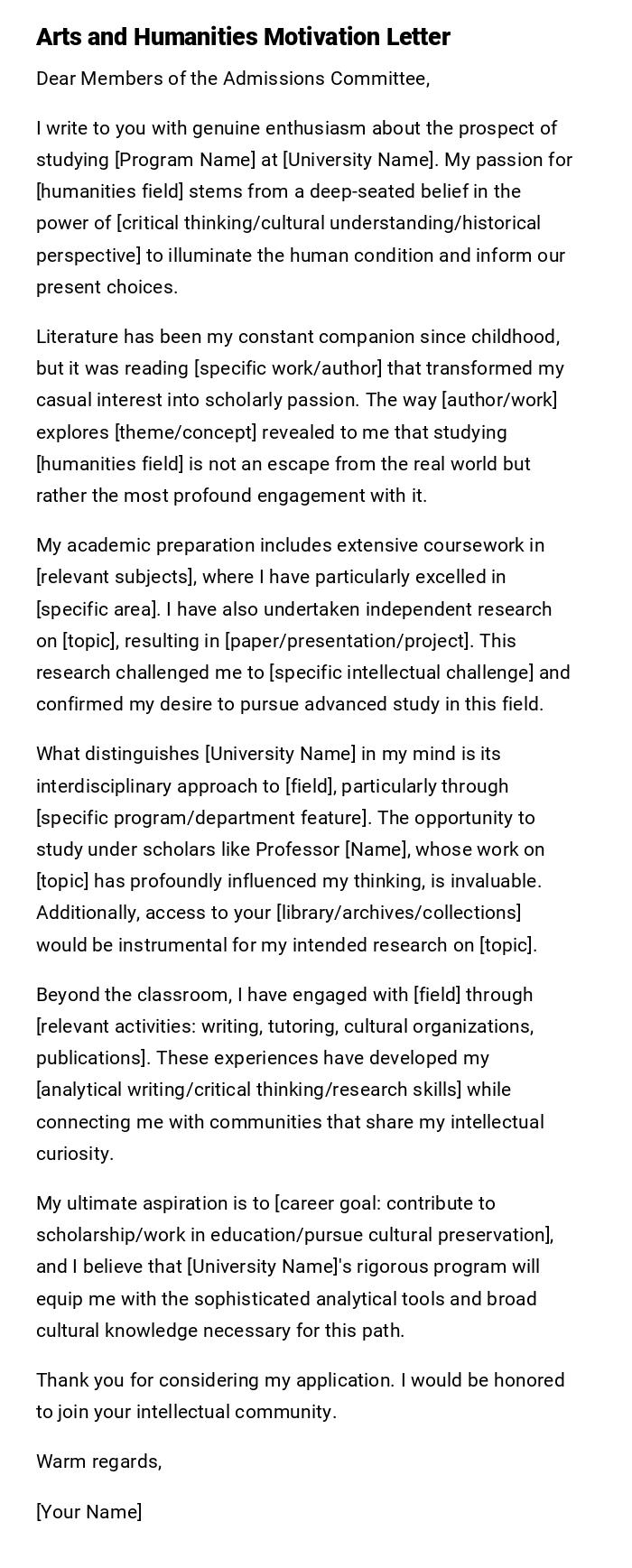
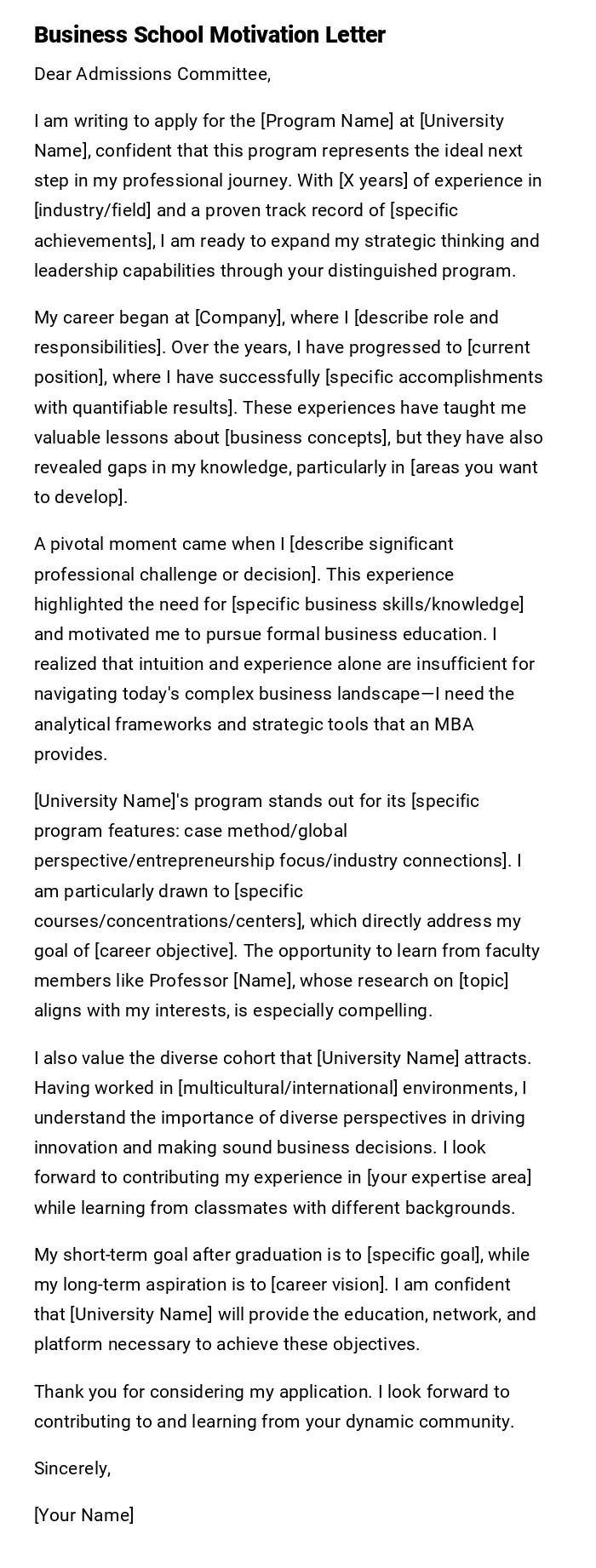
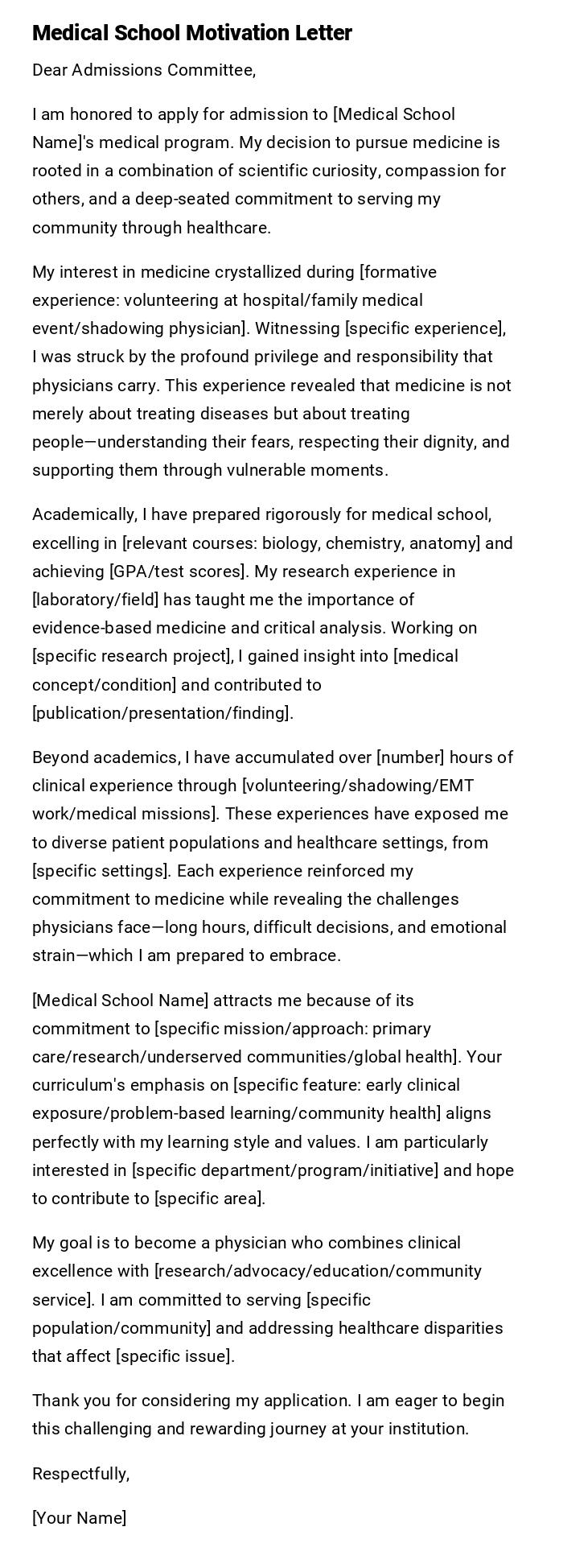
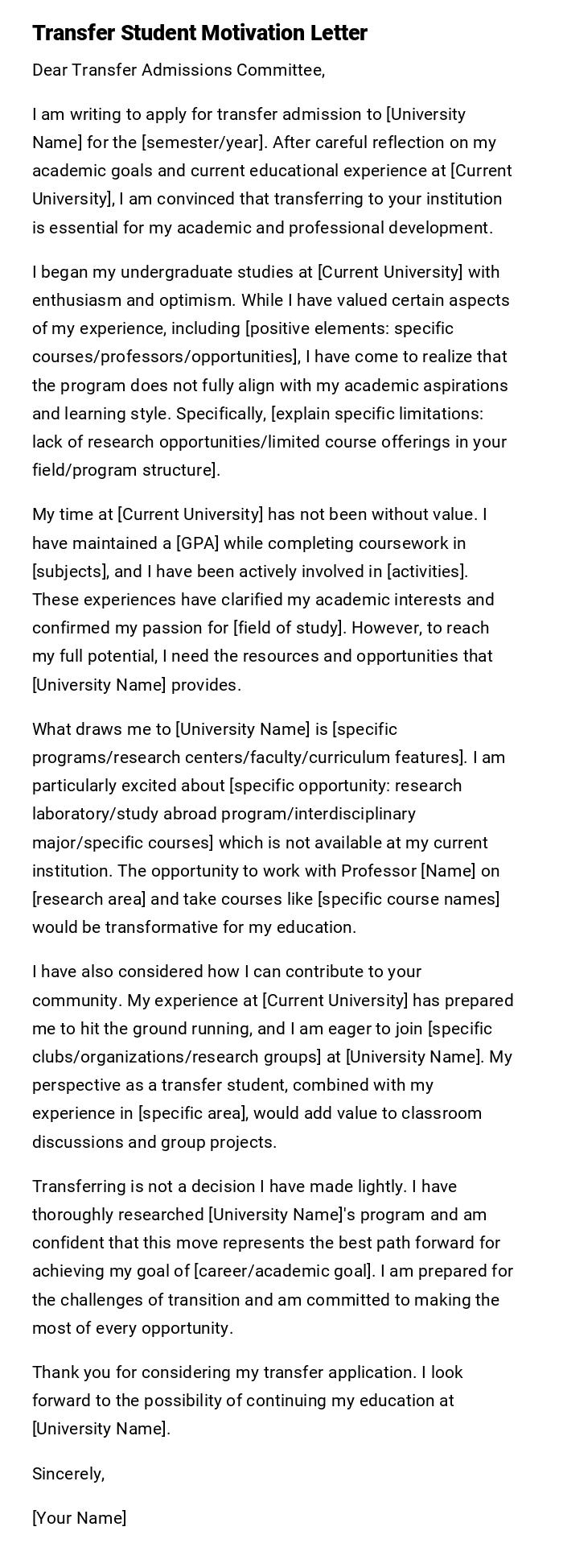



 Download Word Doc
Download Word Doc
 Download PDF
Download PDF